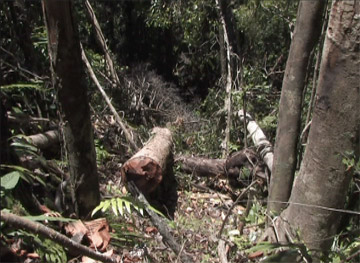Delmas, a French shipping company that has been under pressure for facilitating the destruction of Madagascar’s rainforest parks, has been cleared to begin picking up contraband rosewood as soon as Monday, report local sources in the Indian Ocean island nation. Leaders behind last year’s military coup — which displaced the autocratic, but democratically elected President Marc Ravalomanana — have signed off on the shipment.
Observers in Vohemar report a frenzy of activity in preparation for the shipment. Rosewood and ebony logs have sitting in the port city for nearly three months while Delmas has wavered on whether the shipment was worth the potential damage to its reputation. On several occasions Delmas has said it would no longer ship illegally logged rosewood from northern Madagascar, but the company has faced heavy pressure from the “transition authority”, which is seeking to use revenue from the rosewood trade to finance campaigns ahead of an election it hopes will legitimize its power grab in March 2009.
 These photos, taken last week in a national park, illustrate an example in which five trees were cut in order to gain access to a single rosewood tree. While five to six trees are typically cut to float a single rosewood tree downstream from harvesting areas, these five trees are not the very lightweight tree species which are used to build transport rafts. Thus the impact of selective rosewood harvesting is substantial. Photo by Erik Patel. |
Madagascar’s most bioiverse rainforest parks have been ravaged by the logging. Tens of thousands of hectares of protected forests have invaded by loggers hired a smuggling syndicate linked with local vanilla barons. The trade has been associated with a rise in commercial bushmeat trafficking of lemurs and other endangered wildlife. Traders and loggers have threatened conservation workers, including breaking the feet of a park ranger in an August attack.
The melee has received little attention outside of Madagascar, but researchers in Europe and the United States have been monitoring the growing timber stockpiles using high resolution satellite images. Law enforcement in the United States and Europe have also stepped up vigilance against illegal timber imports. In November federal agents raided a factory run by Gibson Guitar for its alleged possession and use of Madagascar rosewood. Meanwhile a major tropical timber importer is Germany is reportedly under investigation for its use of ebony taken from within protected areas. But rosewood is mostly shipped to China, making law enforcement efforts in the U.S. and Europe largely futile.
The outlook for Madagascar’s forests thus remains bleak. Due to the military coup and subsequent crackdown on the press and opposition, donor nations have cut aid to Madagascar, grounding the agencies and organizations — including the local branches of international NGOs — that run social and environmental programs in the country. The increasingly desperate interim government is now looking to exploit whatever it can to maintain its tenuous grip on power: national parks are a prime target.
Related articles
How to end Madagascar’s logging crisis

(02/10/2010) In the aftermath of a military coup last March, Madagascar’s rainforests have been pillaged for precious hardwoods, including rosewood and ebonies. Tens of thousands of hectares have been affected, including some of the island’s most biologically-diverse national parks: Marojejy, Masoala, and Makira. Illegal logging has also spurred the rise of a commercial bushmeat trade. Hunters are now slaughtering rare and gentle lemurs for restaurants.
Satellites being used to track illegal logging, rosewood trafficking in Madagascar

(01/28/2010) Analysts in Europe and the United States are using high resolution satellite imagery to identify and track shipments of timber illegally logged from rainforest parks in Madagascar. The images could be used to help prosecute traders involved in trafficking and put pressure on companies using rosewood from Madagascar.
Coup leaders sell out Madagascar’s forests, people

(01/27/2010) Madagascar is renowned for its biological richness. Located off the eastern coast of southern Africa and slightly larger than California, the island has an eclectic collection of plants and animals, more than 80 percent of which are found nowhere else in the world. But Madagascar’s biological bounty has been under siege for nearly a year in the aftermath of a political crisis which saw its president chased into exile at gunpoint; a collapse in its civil service, including its park management system; and evaporation of donor funds which provide half the government’s annual budget. In the absence of governance, organized gangs ransacked the island’s biological treasures, including precious hardwoods and endangered lemurs from protected rainforests, and frightened away tourists, who provide a critical economic incentive for conservation. Now, as the coup leaders take an increasingly active role in the plunder as a means to finance an upcoming election they hope will legitimize their power grab, the question becomes whether Madagascar’s once highly regarded conservation system can be restored and maintained.